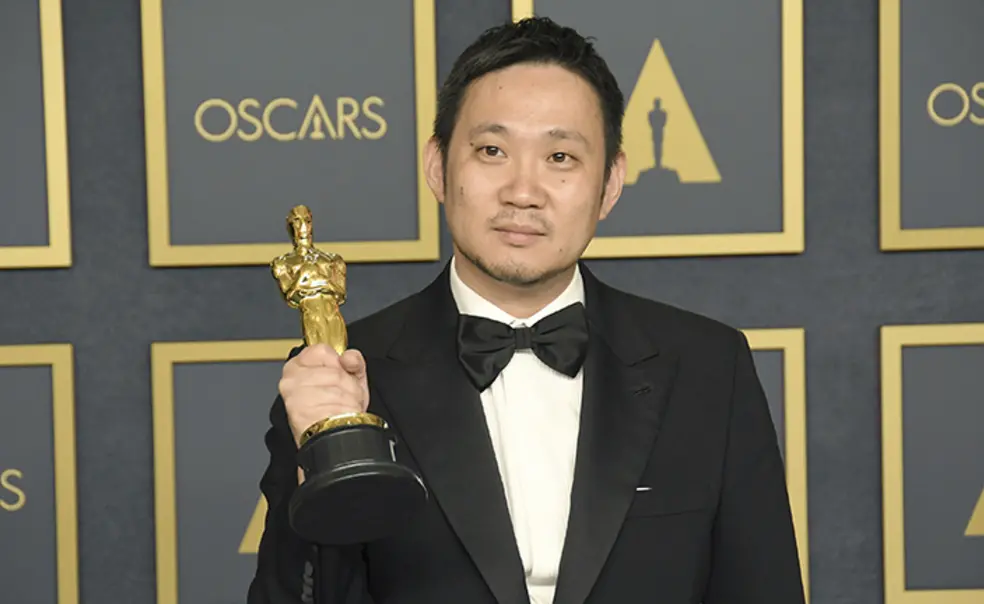Director Ryûsuke Hamaguchi Shows Students Acting, Directing Techniques
Acting is best when you’re not thinking about it, Hamaguchi tells students
“Many people assume that acting is really about hiding who you are,” Academy Award-winning director and screenwriter Ryûsuke Hamaguchi told a select group of Princeton students in a 9/24 lecture.
Instead, he said, it’s about blending your life experiences with your role. “I’d like you to share your own secrets with your character…. Remember that the character you will be developing would not exist if you weren’t in the world.”
The lauded Japanese director, who won an Oscar for his 2021 film Drive My Car, led an exclusive four-day film creation workshop for students as part of a weeklong residency at the University, organized by Princeton Japanese lecturer Keiko Ono. Hamaguchi selected a screenplay written by Sabrina Kim ’24 from a group of student submissions, and he also chose a team of nine student actors and production assistants who rehearsed and recorded three short films. The films were edited by Hamaguchi and presented in a public screening.
Hamaguchi, speaking with students and audience members through translator Tara McGowan ’90, worked personally with the participants to share his unique directing methodologies.
His signature style of actor preparation, the “line reading” method — passed down and adapted by several notable directors — consists of actors reading their lines over and over in a completely monotone and emotionless manner. This helps actors subvert stereotypical acting tropes and innately memorize the text, and it allows seeds of deep emotion to rise from within.
“Really, it is all about expanding the field of your unconscious,” Hamaguchi said. “No matter how good your acting is, if you’re doing it with intention, you’re going to get across the sense that you’re acting. By unconsciously allowing your body to react… it’s the opposite [of] expressing the text. The text will bring something out of you.”
Hamaguchi has used the technique to elicit deeply naturalistic performances from the actors in his films such as Wheel of Fortune and Fantasy (2021) and Drive My Car. (The former is a trio of three distinct modern love stories, and the latter follows a theater artist directing Chekhov while grieving.)
“Over time, by saying it monotone, and then [emoting] only right when we were shooting … you were slowly absorbing into the role,” said Laura Reyes ’25, who was participating in the workshop as an actor, at the screening.
“I think it’s clear from the film that we were actually feeling the emotions, and not just saying [the words],” said workshop actor Chloe Satenberg ’24. “This is probably an acting method that I will take with me for the rest of my life.”
Hamaguchi’s directing style is precise and musical. He encouraged students to “develop a sensitivity to their own voice,” and selected Kim’s script for the workshop because it “breaks down the barrier between poetry and everyday language.” His actor-focused approach was noticed by students both behind and in front of the camera.
“Hamaguchi-san is a master director, but he was so invested in us,” said Ethan Luk ’24, an actor and production assistant. “It wasn’t hierarchical: It felt like we were on the same playing field.”
For Kim, working with Hamaguchi came after months of admiring his films. It allowed her to connect his writing style with her own.
“I have a special relationship with Drive My Car. I wrote my screenplay thinking about unrequited desire, love for a place or for ancestry, and the relationality between languages. I see those qualities of quietness, time, and agency in Hamaguchi-san’s work, which is maybe why I’m so appreciative of it,” Kim said.
“For me, this was a really important experience,” said Hamaguchi of the workshop.
The students agreed.
“Apart from the workshop’s rigor, I really appreciated our conversations, and laughter, and vulnerability,” said Kim. “It was such a gift to make these films. I feel very lucky.”
Watch the trailer for Drive My Car:












No responses yet